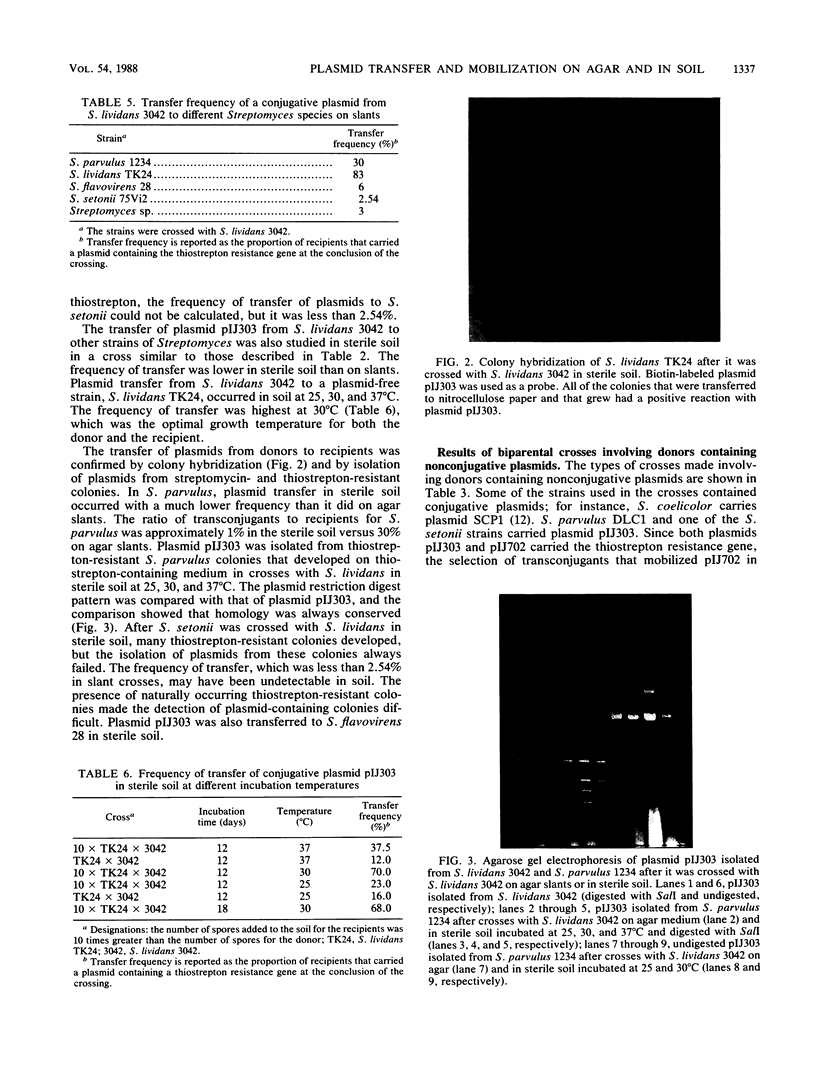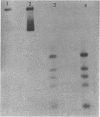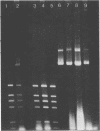Abstract
The conjugative plasmid pIJ101 and its conjugative nondeletion derivatives pIJ303 and pIJ211 were tested for their transferability between strains of Streptomyces on laboratory media and in the soil environment. Their roles in the mobilization of the cloning vector plasmid pIJ702, a nonconjugative deletion derivative of pIJ101, were also examined. Biparental and triparental crosses were performed on agar slants and in sterile soil between the plasmid donor Streptomyces lividans and several recipient Streptomyces strains previously isolated from soil. Conjugative plasmids were transferred to seven recipients in slant crosses and to three recipients in soil. Plasmids isolated from recipients showed restriction fragment patterns identical to that of the original plasmid in S. lividans. Plasmid pIJ303 was transferred less frequently in soil than on slants, and the frequency of transfer was higher at 30 degrees C than at the other temperatures examined. Transconjugant Streptomyces strains differed in their ability to maintain pIJ303. The nonconjugative plasmid pIJ702 was mobilized on agar slants into S. coelicolor 2708, which already contains a self-transmissible plasmid. Plasmid pIJ702 was also mobilized into S. flavovirens, Streptomyces sp. strain 87A, and S. parvulus on slants and in sterile soil after triparental crosses with two donors, one containing pIJ702 and the other containing either pIJ101 or pIJ211. The presence of a conjugative plasmid donor was required for the transfer of pIJ702 to S. parvulus 1234, S. flavovirens 28, and Streptomyces sp. strain 87A. Plasmid pIJ702 was always transferred in its normal, autonomous form. Chromosomal recombination also occurred in transconjugants after the transfer of pIJ702. This is the first report of gene transfer between Streptomyces strains in soil.
Full text
PDF






Images in this article
Selected References
These references are in PubMed. This may not be the complete list of references from this article.
- Crawford D. L. Lignocellulose decomposition by selected streptomyces strains. Appl Environ Microbiol. 1978 Jun;35(6):1041–1045. doi: 10.1128/aem.35.6.1041-1045.1978. [DOI] [PMC free article] [PubMed] [Google Scholar]
- Dekleva M. L., Titus J. A., Strohl W. R. Nutrient effects on anthracycline production by Streptomyces peucetius in a defined medium. Can J Microbiol. 1985 Mar;31(3):287–294. doi: 10.1139/m85-053. [DOI] [PubMed] [Google Scholar]
- Gealt M. A., Chai M. D., Alpert K. B., Boyer J. C. Transfer of plasmids pBR322 and pBR325 in wastewater from laboratory strains of Escherichia coli to bacteria indigenous to the waste disposal system. Appl Environ Microbiol. 1985 Apr;49(4):836–841. doi: 10.1128/aem.49.4.836-841.1985. [DOI] [PMC free article] [PubMed] [Google Scholar]
- Ghangas G. S., Wilson D. B. Expression of a Thermomonospora fusca Cellulase Gene in Streptomyces lividans and Bacillus subtilis. Appl Environ Microbiol. 1987 Jul;53(7):1470–1475. doi: 10.1128/aem.53.7.1470-1475.1987. [DOI] [PMC free article] [PubMed] [Google Scholar]
- Hintermann G., Zatchej M., Hütter R. Cloning and expression of the genetically unstable tyrosinase structural gene from Streptomyces glaucescens. Mol Gen Genet. 1985;200(3):422–432. doi: 10.1007/BF00425726. [DOI] [PubMed] [Google Scholar]
- Hopwood D. A., Lydiate D. J., Malpartida F., Wright H. M. Conjugative sex plasmids of Streptomyces. Basic Life Sci. 1985;30:615–634. doi: 10.1007/978-1-4613-2447-8_43. [DOI] [PubMed] [Google Scholar]
- Jain R. K., Sayler G. S. Problems and potential for in situ treatment of environmental pollutants by engineered microorganisms. Microbiol Sci. 1987 Feb;4(2):59–63. [PubMed] [Google Scholar]
- Katz E., Thompson C. J., Hopwood D. A. Cloning and expression of the tyrosinase gene from Streptomyces antibioticus in Streptomyces lividans. J Gen Microbiol. 1983 Sep;129(9):2703–2714. doi: 10.1099/00221287-129-9-2703. [DOI] [PubMed] [Google Scholar]
- Kieser T., Hopwood D. A., Wright H. M., Thompson C. J. pIJ101, a multi-copy broad host-range Streptomyces plasmid: functional analysis and development of DNA cloning vectors. Mol Gen Genet. 1982;185(2):223–228. doi: 10.1007/BF00330791. [DOI] [PubMed] [Google Scholar]
- McPherson P., Gealt M. A. Isolation of indigenous wastewater bacterial strains capable of mobilizing plasmid pBR325. Appl Environ Microbiol. 1986 May;51(5):904–909. doi: 10.1128/aem.51.5.904-909.1986. [DOI] [PMC free article] [PubMed] [Google Scholar]
- Murooka Y., Ishizaki T., Nimi O., Maekawa N. Cloning and expression of a Streptomyces cholesterol oxidase gene in Streptomyces lividans with plasmid pIJ702. Appl Environ Microbiol. 1986 Dec;52(6):1382–1385. doi: 10.1128/aem.52.6.1382-1385.1986. [DOI] [PMC free article] [PubMed] [Google Scholar]
- Pettey T. M., Crawford D. L. Enhancement of Lignin Degradation in Streptomyces spp. by Protoplast Fusion. Appl Environ Microbiol. 1984 Feb;47(2):439–440. doi: 10.1128/aem.47.2.439-440.1984. [DOI] [PMC free article] [PubMed] [Google Scholar]
- Pulido D., Vara J. A., Jiménez A. Cloning and expression in biologically active form of the gene for human interferon alpha 2 in Streptomyces lividans. Gene. 1986;45(2):167–174. doi: 10.1016/0378-1119(86)90251-9. [DOI] [PubMed] [Google Scholar]
- Saye D. J., Ogunseitan O., Sayler G. S., Miller R. V. Potential for transduction of plasmids in a natural freshwater environment: effect of plasmid donor concentration and a natural microbial community on transduction in Pseudomonas aeruginosa. Appl Environ Microbiol. 1987 May;53(5):987–995. doi: 10.1128/aem.53.5.987-995.1987. [DOI] [PMC free article] [PubMed] [Google Scholar]
- Southern E. M. Detection of specific sequences among DNA fragments separated by gel electrophoresis. J Mol Biol. 1975 Nov 5;98(3):503–517. doi: 10.1016/s0022-2836(75)80083-0. [DOI] [PubMed] [Google Scholar]
- Stotzky G., Babich H. Survival of, and genetic transfer by, genetically engineered bacteria in natural environments. Adv Appl Microbiol. 1986;31:93–138. doi: 10.1016/s0065-2164(08)70440-4. [DOI] [PubMed] [Google Scholar]
- Trevors J. T., Oddie K. M. R-plasmid transfer in soil and water. Can J Microbiol. 1986 Jul;32(7):610–613. doi: 10.1139/m86-114. [DOI] [PubMed] [Google Scholar]






